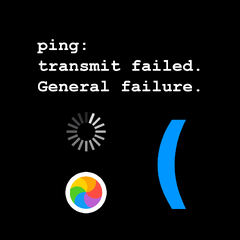-
Posts
114 -
Joined
-
Last visited
Reputation Activity
-
 bloodthirster got a reaction from scottyseng in Looking for Hardware RAID Controller Recommendations
bloodthirster got a reaction from scottyseng in Looking for Hardware RAID Controller Recommendations
Why hardware RAID?
You have to make sure the RAID HW card is going to be around when the card breaks or just buy a spare. If you can't, all that data probably can't be accessed since you generally need the same HW RAID card to access the data on the storage drives. Unless there's a really good reason to get a HW RAID card, it's another point of failure that can potentially leave you without access to the data on the drives. HW RAID can be good, but especially for one off type of projects, they can do more harm than good. I'd seriously ask the question if adding another point of failure (which can leave you unable to access your data) is worth the benefit you get from it.
-
 bloodthirster got a reaction from Needfuldoer in Looking for Hardware RAID Controller Recommendations
bloodthirster got a reaction from Needfuldoer in Looking for Hardware RAID Controller Recommendations
Why hardware RAID?
You have to make sure the RAID HW card is going to be around when the card breaks or just buy a spare. If you can't, all that data probably can't be accessed since you generally need the same HW RAID card to access the data on the storage drives. Unless there's a really good reason to get a HW RAID card, it's another point of failure that can potentially leave you without access to the data on the drives. HW RAID can be good, but especially for one off type of projects, they can do more harm than good. I'd seriously ask the question if adding another point of failure (which can leave you unable to access your data) is worth the benefit you get from it.
-
 bloodthirster got a reaction from TimedPing in Need help & suggestion on building "Portable" ARM-based NAS.
bloodthirster got a reaction from TimedPing in Need help & suggestion on building "Portable" ARM-based NAS.
I have a Honeycomb LX2 and have had issues with:
- warm boots don't work (later board revisions fix this but Solid Run won't update old boards like mine)
- SATA has signaling issues so you're maxed out at 3Gbps, at 6Gbps there's so many errors the drive drops out
- building firmware is flaky at best. I've built firmware before but could never get anything I built to boot, even following their instruction in docker and native
- included heatsink needs upgrading if you're doing anything heavy
It's a shame since if they fixed these issues I could actually recommend it here. I am still using mine as a NAS with a SuperMicro SATA/SAs controller running in JBOD with ZFS, but I wouldn't want anyone to go through the pain I went through. It was originally going to be an ARM test and dev system but because the warm boot issue it's useless for that.
-
 bloodthirster reacted to Ralphred in A suitable linux distro and software for Multiseat Desktop Virtualizations?
bloodthirster reacted to Ralphred in A suitable linux distro and software for Multiseat Desktop Virtualizations?
I do this, it's pretty easy to do, but I had most of the prerequisites to make it really easy (be using SDDM, be using X, have multiple GPU's)
If I was doing it from scratch for more than 2 seats with the idea of running VM's in each "seat instance" then I wouldn't bother with multiseat at all as the main advantage of using cheap old GFX cards as assignable outputs for a "proper GPU" doing all the heavy lifting wouldn't work with VM's, and using multiseat to bootstrap VM's would be a lot of wasted overhead for something that can be scripted.
Having a gfx card per VM instance is obviously simple to do with passthrough, and helps with the audio issue qemu creates when you don't want a spice terminal, but if you have VMware created VM's then you are better off just biting the bullet and using the VMware virtual gfx extensions (Horizon?). I've not used VMware in about 10 years or so, and when I did it was for HA and redundancy, not resource sharing, and it was really simple to use (as in designed to be used by IT people, no dev level understanding needed).
If you are using a discreet GPU per VM then doing what you ask is simple with VMM and virsh, but you need to be on top of the vfio-pci.ids in the kernel command line.
But back to the original question:
Anything really, but for the sake of overhead debian, arch or gentoo would be the prime choices, with debian being the easiest/quickest to reach the "project start point" where you are implementing your goal and not laying foundations. VMM gives you a UI to "build" your first VM and/or administer them further. You could either: create two boot options where the admin option gives you a UI for VM administration and one less VM available OR have an autologin VNC session (locked obviously) running that you can attach to administer VM's. Setting the VM's up to run on their own virtual network is kind of built into VMM with very little tinkering, and virsh can attach all the right USB devices to the right VM.
-
 bloodthirster got a reaction from Dr0y in Am I the only one who hates mechanical keyboards?
bloodthirster got a reaction from Dr0y in Am I the only one who hates mechanical keyboards?
I have a happy hacking pro and I absolutely love it. I've tried various mechanical KBs (even bought a red dragon as backup), but I just dig the topre the best.
-
 bloodthirster got a reaction from Der_Krampus in Anyone remember Linus Tech Tips?
bloodthirster got a reaction from Der_Krampus in Anyone remember Linus Tech Tips?
Alex is my favorite and James my least. Linus is pretty high up there too, along with Riley. For some reason when James hosts, I get this sudden urge to punch my monitor... I'm sure he's a nice guy IRL but how he presents himself on camera drives me mad.
-
 bloodthirster reacted to Ezzy-525 in Anyone remember Linus Tech Tips?
bloodthirster reacted to Ezzy-525 in Anyone remember Linus Tech Tips?
Same. It's that brogrammer vibe he has.
-
 bloodthirster got a reaction from Ezzy-525 in Anyone remember Linus Tech Tips?
bloodthirster got a reaction from Ezzy-525 in Anyone remember Linus Tech Tips?
Alex is my favorite and James my least. Linus is pretty high up there too, along with Riley. For some reason when James hosts, I get this sudden urge to punch my monitor... I'm sure he's a nice guy IRL but how he presents himself on camera drives me mad.
-
 bloodthirster got a reaction from ahuckphin in USD 100 Phone vs Point & Shoot
bloodthirster got a reaction from ahuckphin in USD 100 Phone vs Point & Shoot
My 2 cents.
Use your phone for now and do research on camera gear. Some of the super low end DSLR and mirrorless bodies aren't really worth getting. There are also surprising decent point and shoots too. Maybe save up and get a decent (but cheap) body and lenses or even a point and shoot, but you'll need to know what you actually want.
Go to a camera store and play with the cameras. Physically hold them and see which brand and or models feel the best and you just ""get" more easily. Then do research based on what you liked the most. Nothing is worse than shelling out money and then being disappointed.
Don't be afraid of a good point and shoot either. While I don't mind lugging around heavy gripped bodies and large glass, that's not for everyone. Finding what works for you and something you'll use the most, is what makes it the best camera (most of the time).
-
 bloodthirster reacted to Chunchunmaru_ in Which Linux Distro qualifies my needs?
bloodthirster reacted to Chunchunmaru_ in Which Linux Distro qualifies my needs?
Hi, Dell usually tends to have supported ACPI because of their XPS developer version which comes out with Ubuntu pre-installed, so you won't have any problems with the backlight, sleep, etc...
As for external drawing screen tablet, usually depends from the availability of the drivers, I got a simple Huion for playing osu, and it works. Wacom should have native support too, its something you can check with Google.
Davinci resolve has a native linux version and is easy to install, has a windows-like setup, but unlike windows, it doesn't support H264 video playback for some reason, so you will need to encode in HEVC or something else, I don't know the details
Any DX11 game is likely to run, except the one with EAC which are something currently unsupported with wine atm which are currently in development with Valve for a solution
As for customization, every linux distro lets you do that
Speaking of safety, viruses are less prone to attack you due to linux being less used in desktops and also because of the package manager, as for hacks/vulnerabilities, as long you update your system regularly, there are no issues compared with WIndows 10 automatic updates, as for privacy, some distros like ubuntu tend to send a minimal quantity of data compared to Windows.
Wine should be capable of running Windows programs, but has to be compatible. C# ones tend to be the most supported
As for the distro, you may choose the one you like, that should have all you need, but if you are unsure choose the most updated one just to be sure to have more drivers for your peripherals you want to run, like Ubuntu 19.04 or PopOS, or Manjaro Linux (Which has a slighly harder learning curve as it's based in arch and is a bit less stable)
You can try a desktop environment like KDE, since has widgets, so Kubuntu would be a choice, or Manjaro KDE, or PopOS with KDE. But GNOME offers customization like Windows too with something like DashToPanel
-
 bloodthirster reacted to Mira Yurizaki in what is latency and input lag ?
bloodthirster reacted to Mira Yurizaki in what is latency and input lag ?
"Latency" is a generic term meaning a delay of an output after receiving some input or the "reaction time" of the system, including "input lag". So you have to provide context as to what part of the system you're talking about.
Otherwise if no context is given, typically network latency is assumed.
-
 bloodthirster got a reaction from trekjunky in Latest Linux Mint locking up
bloodthirster got a reaction from trekjunky in Latest Linux Mint locking up
You can try setting software that's compute intensive to a high nice value so it doesn't compete for your needs. Leave htop running and see if it's using all the RAM or swap too. True to log into the system via ssh if you can also when it freezes. It might take a minute or two if it under heavy load though.
-
 bloodthirster got a reaction from LAwLz in I just got my own linux server what should I use it for.
bloodthirster got a reaction from LAwLz in I just got my own linux server what should I use it for.
Also, don't feel like you even need to learn everything upfront. A lot of the Linux guys I work with have been using it for 20 years or so. Most people learn over time and gradually build up skills. Just don't be shy about learning and have some patience and you'll be fine.
And that's actually a blessing in disguise (the lack of GUI). CLI is a lot faster on remote systems and if you ever want to mess with embedded systems, obviously there won't be a GUI.
Just don't forget to have fun. =]
-
 bloodthirster got a reaction from Picnic Table in I just got my own linux server what should I use it for.
bloodthirster got a reaction from Picnic Table in I just got my own linux server what should I use it for.
Also, don't feel like you even need to learn everything upfront. A lot of the Linux guys I work with have been using it for 20 years or so. Most people learn over time and gradually build up skills. Just don't be shy about learning and have some patience and you'll be fine.
And that's actually a blessing in disguise (the lack of GUI). CLI is a lot faster on remote systems and if you ever want to mess with embedded systems, obviously there won't be a GUI.
Just don't forget to have fun. =]
-
 bloodthirster reacted to Bitter in I just got my own linux server what should I use it for.
bloodthirster reacted to Bitter in I just got my own linux server what should I use it for.
The best way to learn Linux (or any OS) is to break it and then fix it. Modern GUI driven Linux isn't hard to use for most tasks, it's a great Windows replacement for older hardware and is wonderful for casual use like internet stuff. It's also great for older people because it's malware resistant to a great degree than Windows.
For you, just use it, do stuff, break it, fix it, learn more about it. Try different kinds of Linux too, I got accustomed to Xubuntu so now it's ALL I use which is a detriment to learning more.
-
 bloodthirster reacted to WereCatf in a lady asked me out for a drink/movie. (ladies help please)
bloodthirster reacted to WereCatf in a lady asked me out for a drink/movie. (ladies help please)
She asked you out, so she has already pretty clearly indicated that she is interested in you. All you need to do is take a shower, groom yourself a little and be yourself. Also, movies are a terrible source for what you should or shouldn't do.
-
 bloodthirster reacted to Jarsky in Sanity Check Needed: Dropping $3000 for pfsense box and home server.
bloodthirster reacted to Jarsky in Sanity Check Needed: Dropping $3000 for pfsense box and home server.
Generally its best practice not to virtualize your router, especially with a single hypervisor host. You'll have no network connectivity while you're doing maintenance on the ESXi host. And if it goes down, your entire network is down while you're getting ESXi and its VM's back up and running.
If you do virtualize it, you'll also want to have the pfSense VM start up first so that routes/vlan's/etc... are initialized to avoid issues with your VM's when they start up.
-
 bloodthirster got a reaction from Electronics Wizardy in Building a render server
bloodthirster got a reaction from Electronics Wizardy in Building a render server
There's an EPIC 16 core high clock model. https://www.servethehome.com/amd-epyc-7371-review-now-the-fastest-16-core-cpu/
Things about Epyc.
It likes 2666Mhz ram better
If you can populate one DIMM per channel (generally it's easier to get the memory running at 2666)
Update the BIOS
They can fit threadripper AIO/water blocks.
Personally, I think the 7371 with an AIO /beefy air cooler would be pretty beast. You could get all core turbo to 3.6Ghz and you'll have plenty of memory BW. You also have ECC RAM and a ton of PCIE lanes for fast storage, networking, and graphic cards. That being said, I'm not too familiar with Intel's high end desktop or workstation products (generally because they're much more pricier).
If money isn't an issue and Intel has started to produce CPUs with fixes for all the security bugs they've been having, they're worth looking at IMO.
-

-
 bloodthirster got a reaction from Blademaster91 in An open letter to Linus: We at /r/linux_gaming are happy to help
bloodthirster got a reaction from Blademaster91 in An open letter to Linus: We at /r/linux_gaming are happy to help
Ok, I'm going to say one thing and leave this charlie foxtrot thread alone.
Linux is different. It's designed differently, made differently, and functions differently. Linux isn't good at being Windows like (but is great at being Unix like), it was never designed for that. Likewise, a lot of the Windows users here need to realize they have a huge bias towards Windows because that's all they've basically used. If you put Windows in front of someone who grew up on Unix/Linux, it's far far far uglier than the other way around (trust me, I've seen it).
Linux can make a fine desktop (or server or embedded systems or...). There are pros and cons of each OS. Like with Windows, hunting down drivers on websites and with Linux, some drivers not being in the kernel. The main thing is that Linux is not Windows and if you treat it as such you won't like it. It's a fundamentally different OS. If you went into Linux and Windows blind having never used a computer, chances are things wouldn't be THAT different. People are used to Windows so they judge an OS on something that's completely different then get upset when things are different.
Is Linux perfect? No. Is Windows perfect? No. If you're happy with Windows, stick with that. No one is asking you or forcing you to use Linux. Unless you're getting paid then it's time to put on the big boy pants. You can't expect two different things to behave the same. If you go into Linux understanding that you'll put effort into it like you did with Windows over the course of years of using it, it's a perfectly reasonable experience. Linux is neither harder or easier to use than Windows nowadays IME, just different.
FYI, I've used Linux for 15 years and Windows since DOS. Both are fine OSs to use today, but they're different. A lot of these arguments in this thread boil down to nitpicks, inherent bias, or failing to realize different things behave differently and neither are better or worse.
-
 bloodthirster got a reaction from Ithanul in An open letter to Linus: We at /r/linux_gaming are happy to help
bloodthirster got a reaction from Ithanul in An open letter to Linus: We at /r/linux_gaming are happy to help
Ok, I'm going to say one thing and leave this charlie foxtrot thread alone.
Linux is different. It's designed differently, made differently, and functions differently. Linux isn't good at being Windows like (but is great at being Unix like), it was never designed for that. Likewise, a lot of the Windows users here need to realize they have a huge bias towards Windows because that's all they've basically used. If you put Windows in front of someone who grew up on Unix/Linux, it's far far far uglier than the other way around (trust me, I've seen it).
Linux can make a fine desktop (or server or embedded systems or...). There are pros and cons of each OS. Like with Windows, hunting down drivers on websites and with Linux, some drivers not being in the kernel. The main thing is that Linux is not Windows and if you treat it as such you won't like it. It's a fundamentally different OS. If you went into Linux and Windows blind having never used a computer, chances are things wouldn't be THAT different. People are used to Windows so they judge an OS on something that's completely different then get upset when things are different.
Is Linux perfect? No. Is Windows perfect? No. If you're happy with Windows, stick with that. No one is asking you or forcing you to use Linux. Unless you're getting paid then it's time to put on the big boy pants. You can't expect two different things to behave the same. If you go into Linux understanding that you'll put effort into it like you did with Windows over the course of years of using it, it's a perfectly reasonable experience. Linux is neither harder or easier to use than Windows nowadays IME, just different.
FYI, I've used Linux for 15 years and Windows since DOS. Both are fine OSs to use today, but they're different. A lot of these arguments in this thread boil down to nitpicks, inherent bias, or failing to realize different things behave differently and neither are better or worse.
-
 bloodthirster got a reaction from Hi P in C++ and C
bloodthirster got a reaction from Hi P in C++ and C
While I'm not a fan of pure OOP because it makes no sense in the work I do, some of the concepts definitely are useful though. It's much better to have a simple implementation (which you can reuse) of what you need in C than use C++ with all the mess/"features" it brings in. Because if you have a feature in a language, people will abuse and misuse it and create garbage with it. There's nothing "wrong" with C++, it just encourages horrible coding habbits and allows programmers to be lazy when they shouldn't. If used properly, C and C++ aren't that far off. C just forces people to see the crap code they're writing more easily and C++ doesn't bring that much to the table to make it worth using (especially since C can do most of the useful stuff C++ can do[abet with a ittle work]).
Ultimately, C++ has a lot more negatives than positives when compared to C when the vast majority of people use it.
-
 bloodthirster reacted to Traches in An open letter to Linus: We at /r/linux_gaming are happy to help
bloodthirster reacted to Traches in An open letter to Linus: We at /r/linux_gaming are happy to help
Subjective opinion I guess; I got tired of it after many years of using it. Also I don't like being spied on, and I don't like the fact that windows answers to Microsoft first, and the user second. That's a deep, fundamental, unfixable problem. Linux's problems are fixable.
Nobody says Linux is perfect. Literally all of us know that there are huge problems with Linux, because we've dealt with them personally. Look at how popular Brian Lunduke's "Linux Sucks" videos are-- we laugh because we can relate. We're saying they're worth it, because Linux brings some huge advantages that you don't find on proprietary operating systems.
You're yelling. Why are you yelling?
I'm not ignoring the usability issues. I'm not saying Linux is the ultimate operating system for all use cases on all hardware. For example I'd never suggest that a pro photographer switch to Linux, because the Adobe suite doesn't run on it and the FOSS alternatives aren't up to scratch. It sucks but it's true. The same is true for gaming-- if you're building a dedicated gaming rig, and your only concern is gaming performance and convenience, you'd be better served by Windows.
My point is that there's more to the story than convenience. I'm making mountains out of molehills here a bit, but take ads in the start menu for example: They demonstrate that Microsoft is willing to actively and deliberately harm its users when it benefits them. And that's only one example; who knows what information it sends back to the mothership? With forced automatic updates, even if it respects your privacy now, there's nothing to say that can't change any day. You, and the community at large, has no way to review new changes to ensure they are in your best interest.
The fundamental difference between a proprietary operating system and an open source one is control. When you run Linux, you are 100%, completely in control of absolutely every aspect of your system. Should you choose to, you can allow or deny absolutely every single thing that your computer does, every entity it communicates with, and every bit of information it sends to them. Even if you don't care to learn those things, others in the community do and you can benefit from their efforts. That is simply not true of Windows, and no amount of yelling changes that.
Security and privacy are crucially important issues. At the risk of being overly dramatic, have you read 1984? A big theme in the book was a complete and total lack of privacy at all times. A lot of Big Brother's power came from complete control of information, both as a consumer and a producer. The biggest instrument of this was the 'telescreen', which is basically a tv with a camera and a microphone. People could be monitored at any time, without their knowledge. Smartphones are basically the same thing these days.
Obviously that book is fiction, but it's well regarded for a reason. Right now, your computer, your phone, and your google account are sharing with strangers a volume of detailed information that you would never voluntarily provide even to your close friends and family. These people don't have your best interest at heart, and they arguably know more about you than even you do yourself. They are simply trying to profit from this information by any viable means, and that's before you even get into the terrifying implications of a government with access to this amount of information with only a subpoena (and often not even that!) The potential for abuse is breathtaking, but because it happens quietly in the background nobody cares.
The only reasonable solution to this problem is free and open source software. If nobody can read the source code, nobody knows what it does. There shouldn't be black box programs spying on people from their own devices, it's immoral and harmful.
You're completely right that Linux can be an absolute pain in the ass sometimes, trust me I know. It's still worth it.
Linux is not a single, unified product delivered by a single organization. It's many groups of people building parts-- this has the benefit of not answering to anyone, and giving the end user an outstanding array of options to choose from in every aspect of their system, but it also complicates support and leads to fragmentation. There's no single piece of software you are forced to use; if you don't like something, literally anything, you can change it. That's not true on windows. Fragmentation sucks in some ways, but in other ways it's truly amazing.
Yeah, unnecessary forking is an issue. But having many different choices can be a good thing.
You're also very angry. I'll say a few things:
It's getting better. It's far from perfect, some things blow windows out of the water, others are a huge pain in the ass, but overall it's miles better than it was even a few years ago. You can download things from a browser just fine on Linux. You don't lose that capability, you just get a better option: Download from a repository where an independent 3rd party has reviewed and signed off on the software as not being malware. The terminal really isn't that bad. It's just different from what you're used to. If you can build a PC, you can learn a little bash.
Seems to me like the anti-linux guys are the angry ones. I'm not here to say everyone and their mother should ditch Windows, I'm here to say that Linux is a viable option for many use cases, rises to the dizzying heights of "better than windows" in some cases (programming mostly), and those use cases are expanding as time goes on. Also, personally I don't like being surveilled by my own computer.
-
 bloodthirster reacted to Mira Yurizaki in C++ and C
bloodthirster reacted to Mira Yurizaki in C++ and C
https://en.wikipedia.org/wiki/Compatibility_of_C_and_C%2B%2B
Basically C++ started off as an offshoot of C the standardization of C. As such, things that were introduced in subsequent C standards may not be compatible with C++.
I'm biased since I was an embedded software developer but just my thoughts with C or C++:
I feel like C++ encourages dynamic memory constructs over static ones. In embedded systems I avoid dynamic memory at all costs in embedded systems because it lowers determinism and requires a heap, which basically eats into what little memory you have. And while I shouldn't be shy about using dynamic memory, it appears C++ still doesn't have a garbage collector, and I really don't want to remember to manage dynamic memory. Yes I'm aware of auto_ptr, but it appears it's still something that must be manually done. This is unlike say C# where I don't have to worry about remembering to run some cleanup routine if an object no longer has references. If you know how to abuse C, you can achieve OOP behavior: https://www.state-machine.com/doc/AN_OOP_in_C.pdf The concept of private and public symbols exists in C, but it's not obvious. And maybe I haven't really made a complex enough design, but I never really had a need for protected members and methods. I haven't used inheritance because I haven't really had a need for it in my designs. I've used virtual functions before via pointer implementation lists.
That's not to say I don't like C++ or think nobody should use it, but I don't feel that C is simply "obsolete" just because there are other languages out there. If there was a major problem I have with C, it's a bare-bones programming language so if you want any of the more fancy features of other programming languages, you're going to have to work at it. Or hope someone has a library that does it for you.
-
 bloodthirster reacted to Juniiii in Experiences with non-techies
bloodthirster reacted to Juniiii in Experiences with non-techies
Actually yes the government has had this technology forever, apps like google earth are limited by law to a certain resolution, but he government has technology to see a tennis ball from space with lots of detail. But it’s not with real time and can only be updated every once in a while.








.thumb.jpg.cb20a8221fe78d0102258b1bdc1335ad.jpg)






